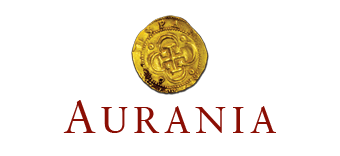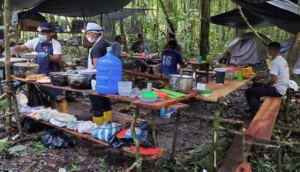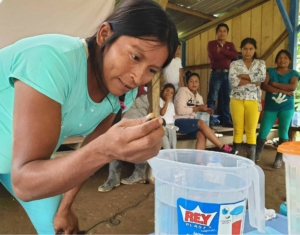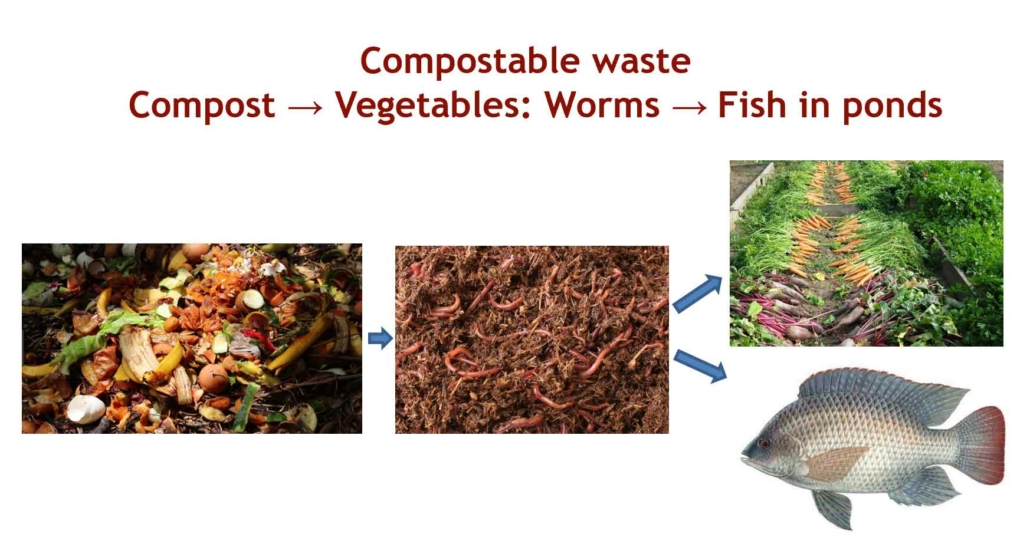President’s Message on Sustainability
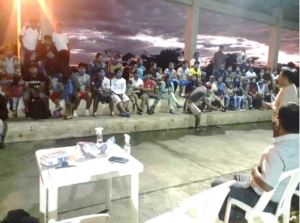
Figure 1 Initial meeting with Company personnel and a community explaining how exploration is done. This is the first meeting held with communities for them to decide on whether to provide access to their land
In Ecuador, Aurania works in one of the most ecologically diverse parts of the planet; one in which some of the most basic human rights are absent, such as access to clean water, basic medical attention, and education. We respect and work according to the guidelines in the Equator Principles and according to the United Nations Declaration on the Rights of Indigenous Peoples which demands, as a first step, asking the local communities if we can access their land after having informed them of the nature of the work that we intend to undertake. And we applaud the Ecuadorian constitution that enshrines the right of nature to be preserved and respected.
Against this backdrop, Aurania strives to minimize its environmental footprint. We were the first exploration company to have achieved ISO14001 environmental registration in Latin America, which is rare in the junior mineral exploration space. Our ISO14001 registration is reviewed and renewed on an annual basis and has been renewed in 2023 without issue. More than this being an achievement, it demonstrates Aurania’s willingness to strive to constantly set the bar higher, to seek guidance to achieve standards that go further than those required by Ecuadorian and Canadian law. The ISO registration provides an additional yardstick with which to measure our performance against our goals and to identify where we can improve within the limits of available resources.
Apart from the tenets of Indigenous Rights, respect for our host communities demands that we do the right thing, knocking on the door of communities to ask their permission to access their land, irrespective of the legal right conferred on the Company as holder of the mineral concession block by the federal government. We withdraw from communities that are not ready or willing to provide access, focusing our work on those areas where access has been granted.
Sustainability starts with the small things: our guides from the communities live in fly-camps with our exploration, environmental, and water management crews, sharing the same very basic tented accommodation, using the same sleeping gear, eating the same food, drinking the same water after enduring the hardship of the jungle during our workday. This provides an opportunity for the development of mutual respect, us learning from the communities and the communities seeing how we treat the environment, trying to minimize our footprint in everything we do: how we treat the water around us, how we manage our waste, and our monitoring of fauna and flora so that we’re gathering baseline environmental information while we’re exploring.
Our management of waste in the drilling camps introduces communities, many for the first time, to sewage management, management of compostable items from the kitchen, recycling, and removal of non-recyclable waste. Interest by the local communities has led to requests to implement similar waste management systems in their communities – where there is no such service provided by municipal authorities. Each person who learns about the impact of waste on the environment is one less person adding to general pollution of a near-pristine environment.
Despite the 2.5 metres of annual rainfall in our area, water is as precious a commodity as anywhere else in the world. The fact is that most of the water to which communities have access is contaminated with human and animal waste, resulting in widespread intestinal infections, especially amongst the young and the old. We have assisted communities with access to clean water through the implementation of rural water systems.
Having access to clean water is considered the first step towards improved and sustainable healthcare. The Company, in co-operation with the Step Forward Foundation (the Foundation), provided funding to complete an unfinished health care centre that is located at a strategic junction that serves 11 communities that previously had no access to care. The Company and the Foundation also work with private and state officials to monitor the health of local communities by assisting with transportation and logistics to enable health initiatives such as vaccination and deworming campaigns.
Limited access to education perpetuates the lack of competitiveness of the Indigenous people for work in the commercial centres in the vicinity of Aurania’s exploration project area (the Project). Apart from helping communities to refurbish a school and provide the necessary school supplies, the Company works with the Ministry of Education to strengthen its reach in the region. In addition to the focus on STEM (science, technology, engineering, and mathematics), education also underscores the importance of maintaining the Indigenous language and culture. The Company and the Foundation have held workshops with teachers at local schools to provide community members with radio and photojournalism skills to help incentivize the use and preservation of the Shuar language.
Nutrition is an area in which Aurania is working to make a sustainable impact. Access to a regular supply of protein is a key area of concern. One area of focus is on working with the older people in the communities to bring back the production of foods that are indigenous to the area and that have been largely forgotten by the younger generation. This is being integrated, in a joint effort with the Ministry of Agriculture, to introduce new products that can augment the quality and variety of the diet of the local people. Excess production is aimed at generating income via access to a broader market via appropriate branding.
Finally, access: this is a double-edged sword. Undoubtedly, the construction of roads would improve access to markets and make it easier for health and education authorities to enter the area. The downside is that road access leads to faster deforestation and perhaps more challenges to maintain and strengthen the Indigenous culture. Our approach is not to build roads; rather, we’re working with the Aviation Authorities to maintain and upgrade, always with the help of the communities, airstrips within the Project area. Our aim, with this approach, is to make the area more accessible to health and education personnel, while maintaining the integrity of the Project area.
Sustainability is an enormous challenge and yet an exciting one through which we aim to ensure that that the communities within Aurania’s Project area are empowered to achieve higher living standards if they want them. This is irrespective of whether Aurania’s exploration programs are successful in discovering major mineral deposits.
